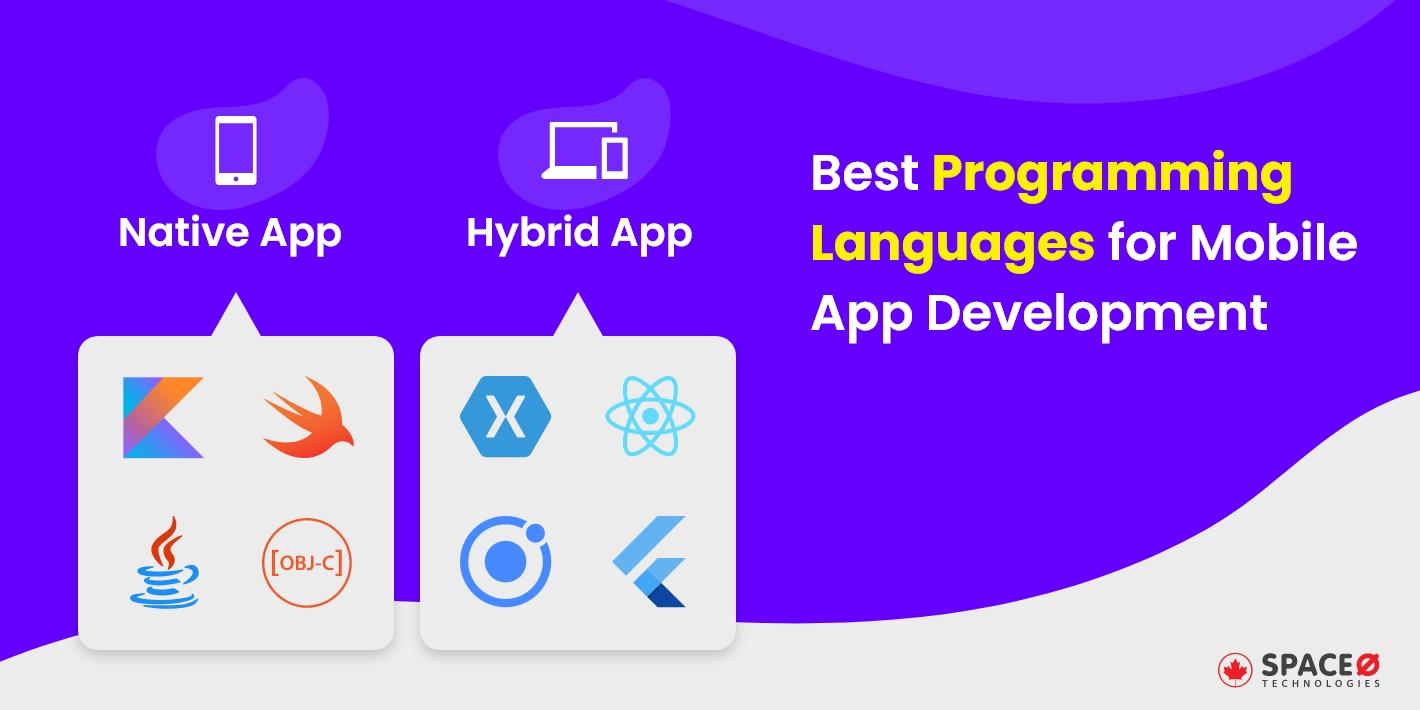
8 Best Mobile App Development Languages and Frameworks in 2026
If you are a mobile app developer, you might have faced the challenge of choosing the right programming language for your project.
According to a survey by StackOverFlow, Swift and Kotlin are top languages for iOS and Android development respectively.
But, there are other top languages as well.
Question: which mobile app development language should you choose?
To make it easier for you, we have created this article that includes native as well as cross-platform mobile app development languages. Also, this blog contains the benefits and limitations of each language. Let’s get started.
Table of Contents
What are the Basic Types of Mobile Apps?
There are two popular mobile apps types.
We have given information on each mobile app type in detail.
Native App
A native mobile app is built to work on a particular mobile operating system like Windows, Android, or iOS. This type of mobile app is built with tools and programming languages that are specific to a single operating system.
Thus, a native app built for the iOS operating system is definite to work only on Apple devices and vice-versa for Android operating systems that work only on Android devices.
Native mobile apps use all the functionalities and device resources to provide proficient performance.
Here are the benefits of having a native mobile app.
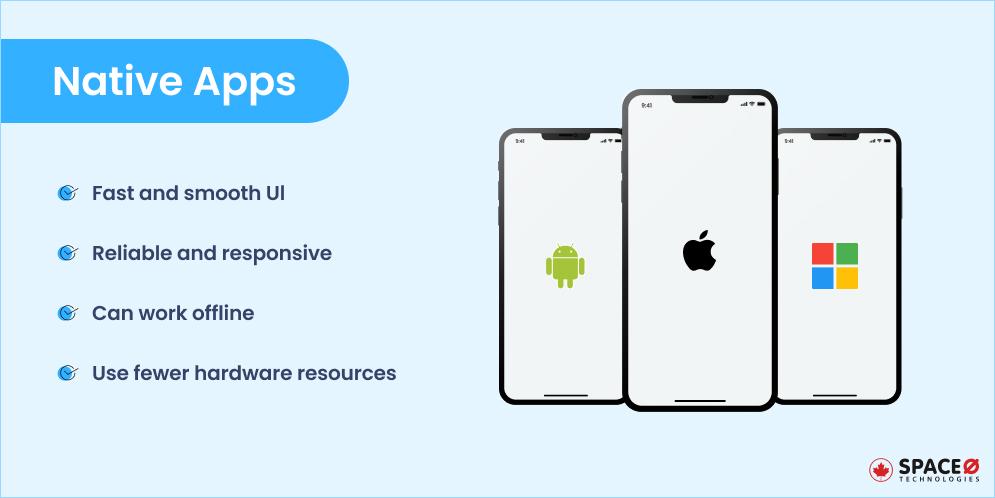
Hybrid App
A hybrid mobile app is a combination of web and mobile applications. This type of mobile app is also known as cross-platform. Hybrid applications are built with the concept of code-shareability over different platforms.
These types of mobile applications work best because they are easier and faster to develop and compatible across devices. The following are the benefits of hybrid mobile apps.
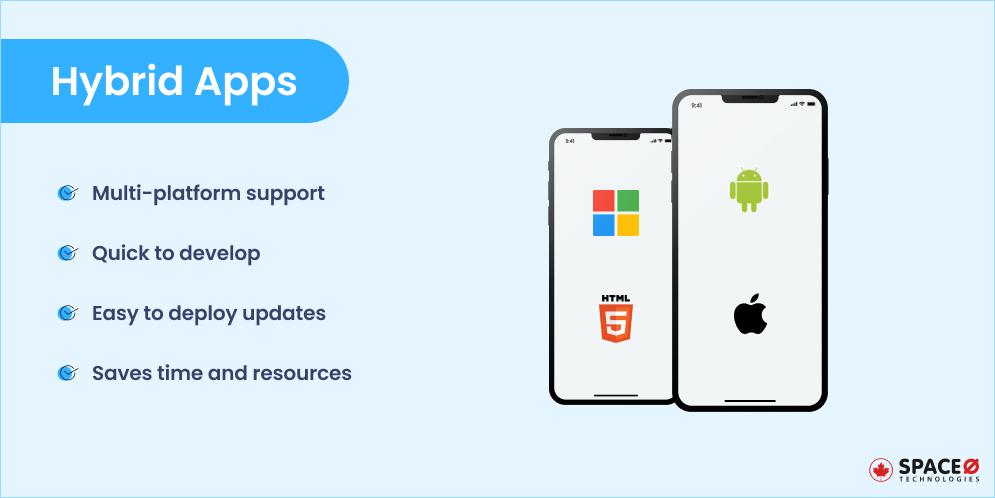
As you have learned about the types of mobile apps and their benefits, now let’s check out the top native apps development languages to develop Android applications.
Native Android App Development Programming Languages
As a leading mobile application development agency we have worked with many programming languages. Here is the list of best language for mobile app development in Android.
| Logo | Name | Current Version | Developed Year | Famous Mobile Apps | Active Developers |
|---|---|---|---|---|---|
 | Java | JDK 16 | 1995 | MinecraftSpotify | 9 million |
 | Kotlin | 1.5.31 | 2016 | EvernoteCoursera | 4 million |
Java
Java is a high-level, and object-oriented, general-purpose programming language, helps developers to create software, desktop as well as mobile applications. It is a default mobile application development programming language and a very popular programming language in the IDE Android Studio.
Mobile app developers consider this as the best programming language for creating Android apps. Writing a program using Java can help to run on any platform with any type of hardware specifications.
Whether you want to develop mobile applications or enterprise-level software applications for your business, Java programming language is preferred by developers due to scalability, flexibility, libraries, and tools available.
Also, Java is intercorporate in various consumer products, such as TVs, mobile devices, set-up boxes, and personal assistant digital devices. Java is also used in network systems that help to create apps that rely on server-client architecture.
Here are the advantages and limitations of Java.
What Are The Advantages and Limitations of Using Java?
Advantages of Using Java Limitations of Using Java Java is simpler to learn and less complex than C++ because it offers better code readability There is no manual garbage collection in Java. Thus, performance in large applications may lead to a problem It has a collection of open-source libraries that impact the cost of developing a mobile app Java is comparatively slower in performance than native languages like C and C++. The programs are written in C and C++ takes lighter memory that results in faster performance Java supports many programming tools (JUnit, ApacheANT, JRat) that make it easier for app developers to create the application within deadlines Code readability in the Java language is a problem because of long and complex code. Java is secure than other programming languages available because code transforms into the byte codes – Kotlin
Kotlin came into existence to overcome the limitations of Java for mobile app developers. This language helps in mobile app development and it is a powerful yet simpler language than Java.

Image Source: Kotlin
The main purpose of this programming language focuses on interoperability, clarity, safety, and tooling support for developing Android apps. Using Kotlin, it is easy to create functional programs that help developers to test mobile applications in a smooth way.
Moreover, Kotlin also offers Multiplatform Mobile SDK enables developers to write cross-platform apps. So, when it comes to deciding between the top framework Flutter and Kotlin language, it creates confusion for app developers. Read our in-depth guide on Flutter vs Kotlin for cross-platform mobile app development to clear your doubts.
Developing mobile apps with Kotlin increases the productivity of the team, and enhances the quality of mobile applications. HeadSpace increases its monthly active users by 20% using Kotlin in their mobile application. Seeing the opportunity of improving HeadSpace’s Android app development team took a step to migrate the entire application into Kotlin language.
Furthermore, let’s understand the advantages and disadvantages of the Kotlin programming language to develop Android apps.
What Are The Advantages and Limitations of Using Kotlin?
Advantages of Using Kotlin Limitations of Using Kotlin Kotlin helps to develop the mobile app with a little less time and is easier to deploy Being a new programming language for Android app development, it has fewer resources available in the market It is an interoperable programming language and experienced developers can easily adopt this language for mobile app development Some of the features of Android Studio like code autocompletion and compilation are slower in Kotlin than in Java There are few chances of bugs in the production environment as the compiler detects every possible mistake in the code Official support to Kotlin programming language is limited compared to Java
Native iOS App Development Programming Languages
| Logo | Name | Current Version | Developed Year | Famous Mobile Apps | Active Developers (Statista) |
|---|---|---|---|---|---|
 | Swift | 5.4.2 | 2014 | Lyft | 5.1 % |
 | Objective-C | 2.0 | 1984 | 2.8 % |
Swift
Whether you want to develop applications for iOS, iPadOS, macOS, tvOS, or watchOS, Swift is the best programming language. As the syntax is concise, it becomes easier for developers to read and maintain the code of applications. It helps developers to create apps that are fast and powerful as it was built to leverage most from the hardware.
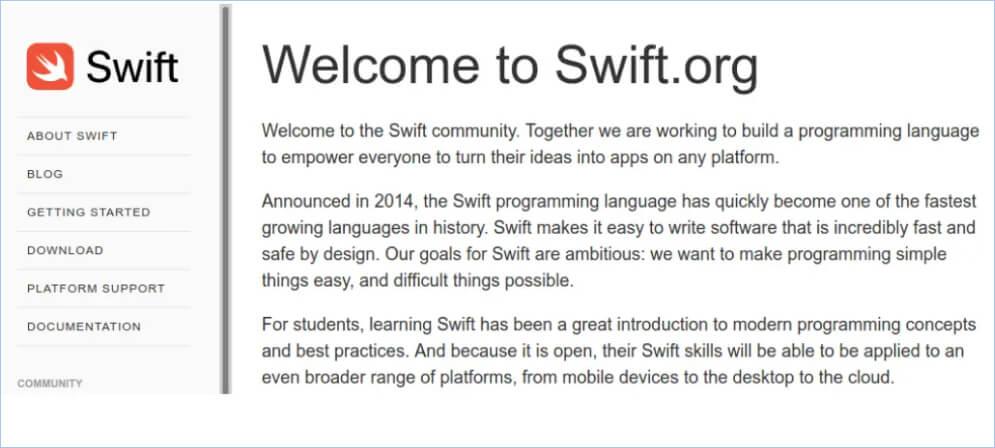
Image Source: Swift
Also, developers use this language for creating modern server applications. If developers want to create server apps for the iOS platform, then Swift provides all the necessary support like runtime safety, compiled performance, and a small memory footprint.
Developers get the interoperability with Objective-C. So if you want to extend existing mobile applications built with Objective-C, then developers can get access to a full project using Objective-C API.
Let’s have a look at the advantages and limitations of the Swift language.
What Are The Advantages and Limitations of Using Swift?
Advantages of Using Swift Limitations of Using Swift Swift is an easier mobile app development language and concise to write programs When any new update of this language gets released, developers face code compatibility issues. So developers claim that they need to write that project completely from scratch Comparing to Objective-C, it consumes less time to perform the same task in Swift The language is only useful to develop applications compatible with iOS7 or later The development of the iOS apps with Swift is 2.6X faster than built with Objective-C – It has automatic reference counting that helps in the memory management of the program. It automatically free ups the space used by class instances when no longers required – Objective-C
Objective-C is an object-oriented programming language. It inherits the syntax of the C language and adds the Smalltalk style to ease the process of finding solutions during programming. Primarily in the 80-90s, this was the language used for developing Apple products.
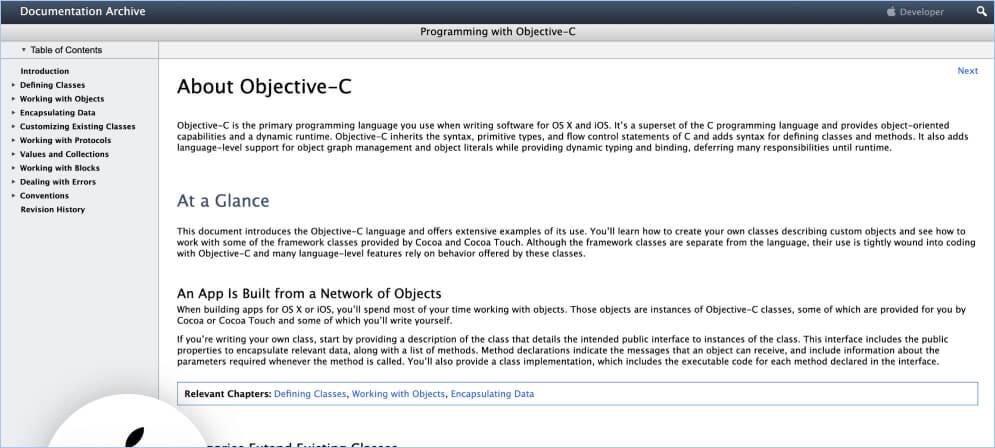
Image Source: Apple
Compared to Swift language, it is the most mature and well-updated programming language used for app development.
Swift is not ABI stable.
What does it mean by not ABI stable?
Not ABI stable means it doesn’t make correct communication with machinery code. So, if you are planning to develop SDK for your own mobile application, then Objective C is a better choice.
Moving further, let’s understand the benefits and limitations of Objective-C.
What Are The Advantages and Limitations of Using Objective-C?
Advantages of Using Objective-C Limitations of Using Objective-C Objective-C is a mature programming language and it becomes easier for developers to look for solutions if they are stuck while coding It has a hard learning curve comparing to other programming languages because its syntax differs Developing a mobile app using Objective-C programming language does not cost you higher because it is a stable release and doesn’t need new versions Comparatively less secure than Swift as there are more chances of vulnerability in Objective-C mobile apps It also supports the earlier versions of Apple OS Objective-C developers need to maintain two files that increase the development time of the mobile app. Thus, it increases the efforts and synchronizing work as well.
Looking to Develop a Scalable iOS Mobile App Solution?
Discuss your requirements with us and validate your mobile app idea. Let our experienced IT professional help you.

4 Best Hybrid Mobile App Development Frameworks
It is preferable to use hybrid mobile app frameworks instead of core programming languages to build hybrid apps.
Why?Because it becomes easy to develop hybrid mobile apps with frameworks as it has less complexity and takes less time.
Here is the list of top hybrid mobile app development frameworks.
| Logo | Name | Core Language | Famous Mobile Apps | Used by Developers (Statista) |
|---|---|---|---|---|
 | Xamarin | C# | OloAzure appFreshDirect | 11% |
 | Flutter | Dart | GrouponCapitalOneeBay | 42% |
 | React Native | JavaScript | InstagramCoinbaseNerdWallet | 42% |
 | Ionic | JavaScript | CNBCSworkitInstantPot | 16% |
Xamarin
Xamarin framework is officially developed by Microsoft and helps to develop cross-platform mobile apps. It is a .Net developer platform created with tools, programming languages, and libraries. The purpose of Xamarin is to help developers to create a cross-platform mobile application that works like native mobile apps but is single code-based.

Image Source: Xamarin
Xamarin extends the use of the .Net platform and the entire code written of the application is in C#. With Xamarin you can develop cross-platform apps that help you to reduce startup time, enhance memory sharing, and performance.
Moreover, it is a part of a strong community, so developers don’t need to invest time in finding solutions for app development. Let’s check out the advantages and limitations of the Xamarin framework.
What Are The Advantages and Limitations of Using Xamarin Framework?
Advantages of Using Xamarin Limitations of Using Xamarin Code for multiple platforms using this single programming framework Creating highly graphical mobile apps in Xamarin requires extensive knowledge of iOS and Android technologies and take more time than building a native application Xamarin’s Forms provides the facility to create a native user experience for each type of mobile OS Mobile apps built using Xamarin are larger in size as they are developed for cross-platforms It is a stable and mature language backed by Microsoft and has a community support It becomes expensive if you are looking to develop an enterprise solution You can build a cost-effective solution and target each platform audience to broader your reach – Flutter
Flutter is gaining trends among worldwide developers for creating amazing and powerful web, mobile, and desktop apps. This framework is made by Google, so you don’t need to worry about its reliability.
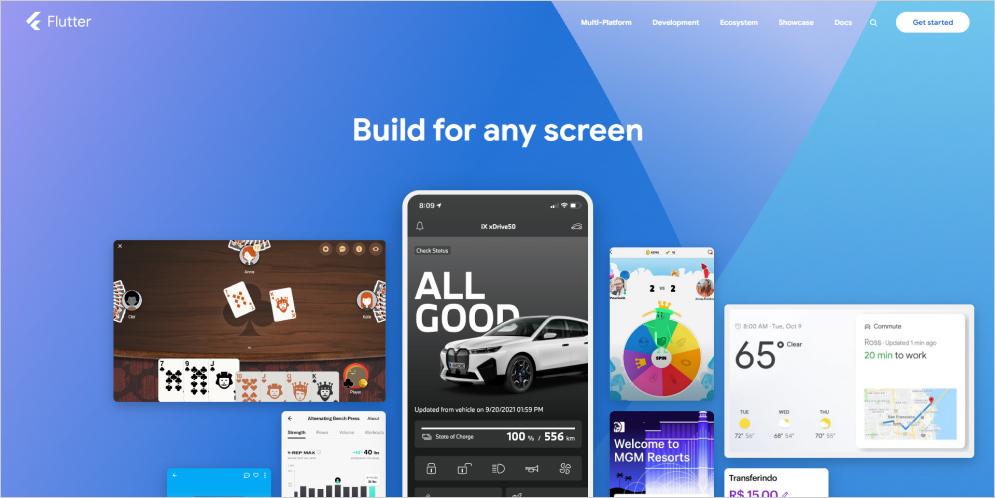
Image Source: Flutter
Google Assistant, BMW, Tencent, and Square are a few companies that use Flutter mobile app development framework to create applications. Due to its hot reload feature, developers can easily make changes in the live screen of the application and speed up the app development process.
Hence, using the Flutter framework, you can save cost, time and ensure a top-notch user experience of your application. If you have an idea of a mobile application for both mobile app development platforms, then choosing Flutter helps you to create an MVP within a limited timeframe.
Now, let’s check out the advantages and limitations of Flutter.
What Are The Advantages and Limitations of Using the Flutter Framework?
Advantages of Using Flutter Limitations of Using Flutter Flutter code is converted into machine code using an engine built-in C/C++ so the application becomes faster and high-performing Flutter is not a mature framework so it is not stable and compatible to work with advanced features Using a single code-base allows you to develop a user interface for both platforms, and it directly helps you to save cost and time Flutter apps require more space in device storage and are larger in size comparing to natively built applications Google has a powerful community of Flutter developers and users, so it becomes easy to find solutions for any problem – React Native
React Native is the second most famous JavaScript-based library to build cross-platform apps. It allows developers to integrate React Native as well as develop new applications that offer seamless performance. When you want to develop interactive mobile apps without compromising user experience, then React Native might help you out.
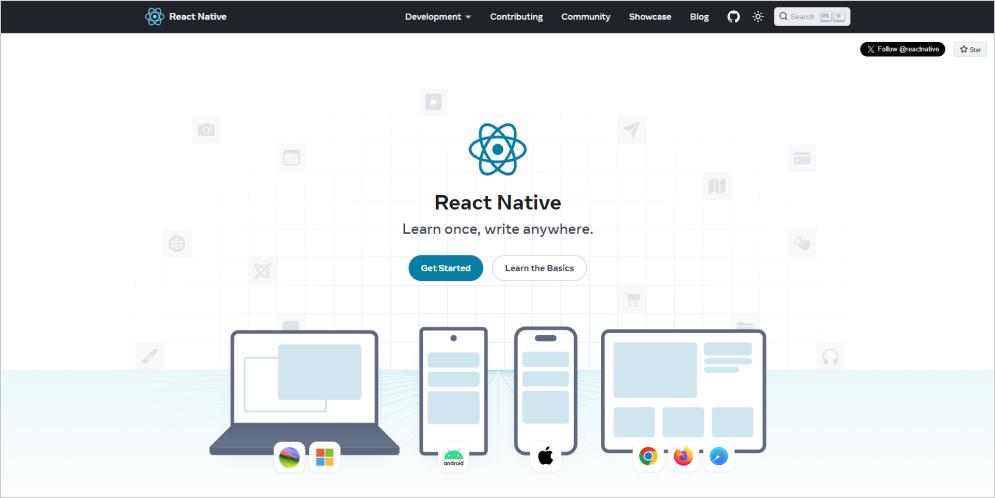
Image Source: React Native
Also, it is preferable for developers who want to develop applications with less complex functionalities. If you are looking to develop an application that can run on any mobile app development platform and should be based on JavaScript, then use React Native. React Native and Flutter both are trending technologies to create robust cross-platform mobile apps so if you are confused to choose one, then here’s the blog on comparison between React-Native vs Flutter.
Following are the advantages and limitations of React Native.
What Are The Advantages and Limitations of Using React Native Framework?
Advantages of Using React Native Limitations of Using React Native React Native offers the solution of data binding that makes your applications more stable React Native is newer in the market, and it is in the improving phase, so it might create difficulty on the applications It has a modular architecture that helps developers to work on building mobile applications with much flexibility and generates better updates between modules This framework lacks in provide robust security thus developing banking and financial apps are risker Developing mobile apps with React Native is easier as it offers various ready-made solutions and libraries to make easy the cross-platform mobile app development process Using React Native, it becomes very difficult to develop a mobile application that has many types of screens like animations, interaction, and transitions React Native cross platforms apps use very little space on mobile devices of all platforms, so it becomes easy to run React applications on less storage of a mobile device Developing a scalable mobile application becomes dependent on integration with other languages like TypeScript due to a lack of type safetys Ionic
Ionic is also known to create single code-based applications that are backed by the power of the web. The current version of Ionic is 2X faster than the previous version in terms of performance. It is a toolkit to create cross-platform apps and web apps.
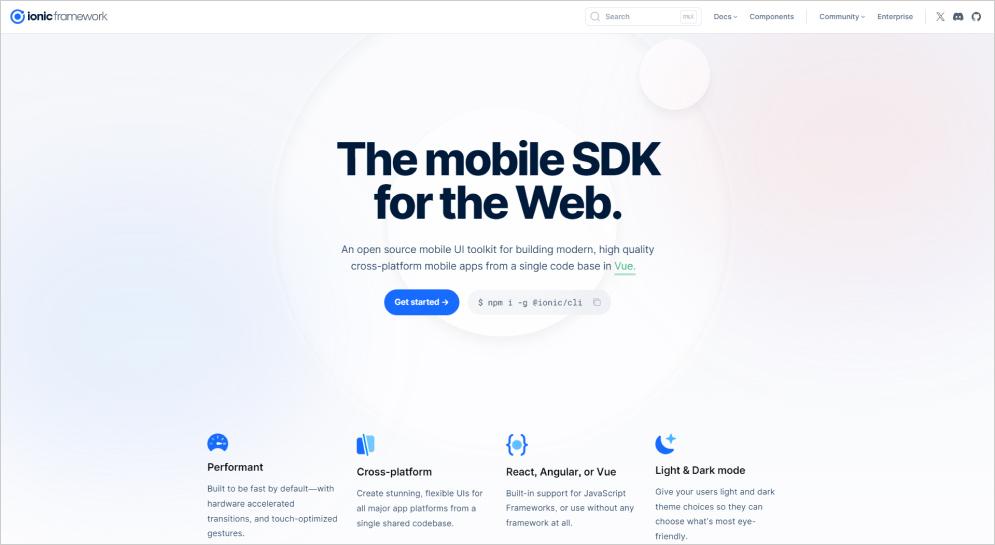
Image Source: Ionic Framework
Developers get to choose between three frameworks that are Angular JS, React Native, and Vue. It has been used by 5 million developers worldwide. And enterprise companies loved to develop application nursing Ionic framework due to its flexibility and help to create streamlined processes.
Below we have discussed the advantages and limitations of Ionic.
What Are The Advantages and Limitations of Using Ionic Framework?
Advantages of Using Ionic Limitations of Using Ionic Ionic helps mobile app developers to create a mobile for each type of platform in a short duration Ionic lacks behind in creating high-level technology. For example, if you want to implement AR in your mobile app, then native programming languages should be your choice Ionic uses web technologies to build mobile applications for both platforms and it can save the cost of development comparing to native app development Ionic is less secure than native mobile apps because this framework is developed with web technologies There are ready-made UI components available in the frameworks that help developers to create native-like feel mobile applications It is difficult to integrate the Java SDK with JavaScript and take the efforts of developers Ionic is the most preferable tool for the faster-creating prototypes of mobile application development –
Want to Create a Custom Cross-platform Mobile Application?
Let our React Native mobile app developers help you by creating a scalable and high-performance application. Get a free consultation now.
Still, have questions related to mobile app development languages? Check out our frequently asked questions.
FAQ About Mobile App Development Languages
Which are the best programming languages for hybrid mobile app development?
There are primarily five programming languages that help you to create hybrid applications. The following are the languages:
- JavaScript
- HTML
- CSS
- Ruby
- Python
How to learn Swift programming language quickly?
Choose the Right App Development Language
Choosing the right programming language for mobile app development is critical as it directly impacts certain factors, such as
- Cost of development
- Timeframe for development
- Native or cross-platform development
- Complex functionalities
So, when you are planning to develop a mobile app, you need to choose a programming language depending on your app type, requirements, and features. Still, if you face any challenges while choosing a programming language for your mobile app idea, connect with us.
We are a leading mobile app development company in Toronto, so connect with us for developing seamless solutions or discuss your idea. We have successfully developed over 100 mobile and web-based projects.

Want to Develop a Mobile App for Your Business?
Editor's Choice
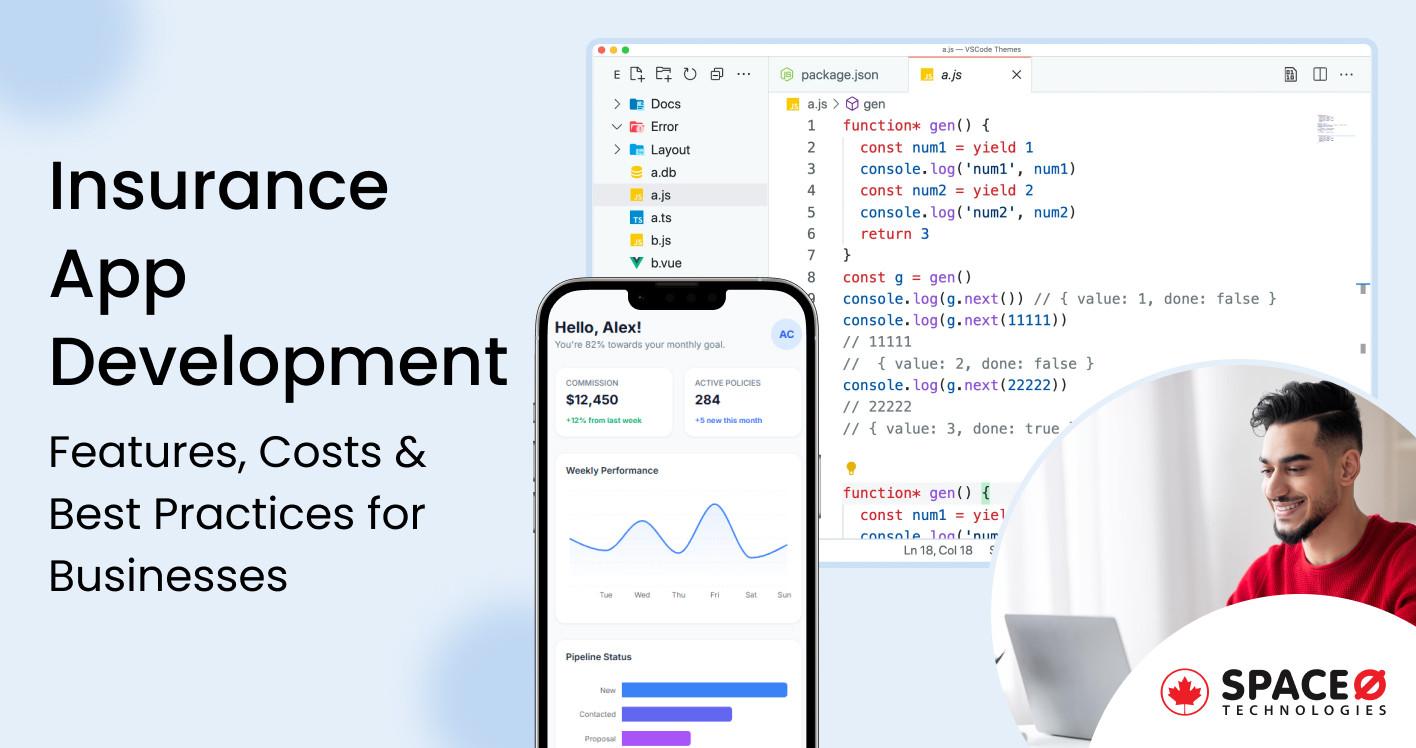
Insurance App Development: Features, Costs & Best Practices for Businesses

Healthcare IT Outsourcing: The Complete Guide for Hospitals, Clinics, and Healthtech Startups in 2025

How to Build a Personal Finance App: Complete Guide
All our projects are secured by NDA
100% Secure. Zero Spam
*All your data will remain strictly confidential.
Trusted by


Bashar Anabtawi
Canada
“I was mostly happy with the high level of experience and professionalism of the various teams that worked on my project. Not only they clearly understood my exact technical requirements but even suggested better ways in doing them. The Communication tools that were used were excellent and easy. And finally and most importantly, the interaction, follow up and support from the top management was great. Space-O not delivered a high quality product but exceeded my expectations! I would definitely hire them again for future jobs!”

Canada Office
2 County Court Blvd., Suite 400,
Brampton, Ontario L6W 3W8
Phone: +1 (437) 488-7337
Email: sales@spaceo.ca

